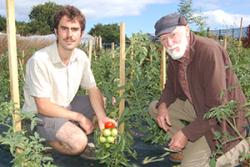Let’s produce really tasty, outdoor-grown tomatoes in Wales and the UK
 James Stroud and David Shaw surveying outdoor-grown tomatoes which are about to be infected with blight, to see how they fare.It’s currently nigh on impossible to grow tasty tomatoes outdoors in the UK- the wet summers of recent years have seen tomato blight decimating any attempts, and major commercial growers have long since given up.
James Stroud and David Shaw surveying outdoor-grown tomatoes which are about to be infected with blight, to see how they fare.It’s currently nigh on impossible to grow tasty tomatoes outdoors in the UK- the wet summers of recent years have seen tomato blight decimating any attempts, and major commercial growers have long since given up.
So our salads currently rely on imported tomatoes or those grown under glass, at far greater expense.
One not-for-profit organisation, the Sárvári Research Trust, is working with experts at ������ϲʹ������� to develop new crops for horticulturists in the UK. The aim is to develop a commercially viable new strain of hardy tomato that would be resistant to late- blight, the disease or organism that usually spells disaster for any outdoor grown tomato crop. The same organism has caused potato blight that resulted in the Irish potato famine.
According to David Shaw, Director of the , based at Abergwyngregyn in Gwynedd:
“Outdoor grown tomatoes, when you can grow them, are delicious and tasty as they’ve grown in direct sunlight. A new hardy variety of blight-resistant tomato could be grown locally by gardeners, allotment holders and market gardeners even in our wet climate. They would be grown without pesticide and so would tick all the boxes for high quality, sustainable, low- input and locally grown food.”
The Trust is developing the new hardy tomato, working with the University. PhD student James Stroud is working on the project under guidance of the Trust and a University academic supervisor, Dr Katherine Steele of the University’s , while also gaining valuable research & development skills.
The Sárvári Research Trust have already successfully developed seven new types of blight free potatoes. These don’t require spraying with fungicides - and this is the hope with the tomato. The research involves looking for wild tomatoes that are resistant to blight and identifying the gene(s) for blight resistance and using non- GM methods, breeding this into a tomato that produces good quality fruit but has natural resistance to blight.
David Shaw said: “We have found common areas of interest between ourselves and the University. This project has enables us to explore research ideas that we would never have been able to explore if it were not for the support provided by KESS.
“Working with Katherine Steele has allowed us to tap into her cutting edge, crop breeding skills. She is training James in the latest molecular techniques to identify genes and to fingerprint the blight organism. This is paramount to the success of the project.”
Katherine Steele said : “This project will help us to better understand blight-resistance in tomatoes, allowing breeders to produce better outdoor varieties for gardeners and growers. This project is one example of our work to provide a scientific basis for sustainable agriculture, forestry and the conservation of natural resources."
James Stroud said: “Working with a company and doing real world oriented research has been really interesting and stimulating. It’s great to be working towards the creation of a marketable product, a product that will grow well outdoors in wales and will therefore provide farmers and growers with a high value crop.”
“The skills that I’ve developed will be applicable to a wide range of employment opportunities. It’s been a delight to get real results from my trials and have them used as part of the breeding programme.”
James Stroud's research scholarship is funded under the Knowledge Economy Skills Scholarships (KESS) Programme. KESS is a major European Convergence programme led by ������ϲʹ������� on behalf of the HE sector in Wales. Benefiting from European Social Funds (ESF), KESS supports collaborative research projects (Research Masters and PhD) with external partners based in the Convergence area of Wales (West Wales and the Valleys). Both the Research Masters and PhD elements are integrated with a high-level skills training programme, leading to a Postgraduate Skills Development Award. KESS will run until 2014 and will provide 400+ PhD and Masters places.
Publication date: 10 September 2013
